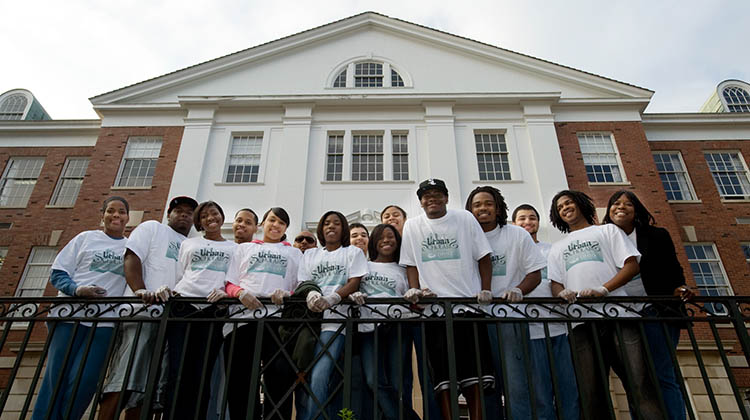
Urban Scholars perform community service work outside McCracken Hall. Photo courtesy of Ohio University Photography
Since 2005, the Urban Scholars Program has broadened access to higher education for accomplished high school graduates from urban school districts across Ohio. This merit and need-based scholarship program assists students in achieving their academic goals at Ohio University.
The scholarship is supported in part by donations from the OHIO community and through fundraising events like the Ebony Bobcat Network’s Annual Theater Scholarship Fundraiser .
Urban Scholars alumni have gone on to receive master’s and doctoral degrees from universities across the country, while exceling in their professional careers. Five of the program’s graduates recently reflected on the impact the program and OHIO have had on their lives.
Below are their excerpted responses to our questions.
What does the Urban Scholars Program mean to you?
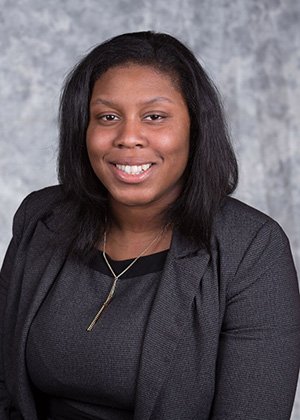
Angelic Dean, BA ’09Dean received her master’s degree in student affairs and higher education from Indiana State University in 2012 and has pursued a career in the non-profit sector. Currently, Dean resides in Columbus, Ohio.
Dean:It has been essential to how I handle things as a professional now. All of the training that we went through prepared me to be able to do a lot of things in my professional career.
Evans:The program is everything. If I didn’t get this scholarship, I wouldn’t have gone to school. It offered a lot of support – financial support – but, also there on campus [from] the upperclassmen and faculty.
Crafter:It literally [was] the difference between going to college or going into the Army. Before I received the scholarship, I had several meetings with one of the Army recruiters. I was only a few weeks away from signing the enlistment papers when I received the Urban Scholars offer.
Pierce:There was always the expectation [in my household] that we would go to college. There was always an understanding that my mom could not pay for it and that we needed to get good grades for us to be able to get scholarships to earn a place. Urban Scholars helped make that a possibility, but also it provided that community and support.
Lindsay:Up front, the obvious thing is that you’re given a full academic ride to attend the University. And that in itself is already huge. However, it also gives you a sense of pride because you’re being recognized for a talent that you have. Here’s an outside group, an unbiased group, coming in and saying that they want to recognize that you are a high-performance student.
What is your fondest memory of the Urban Scholars Program?
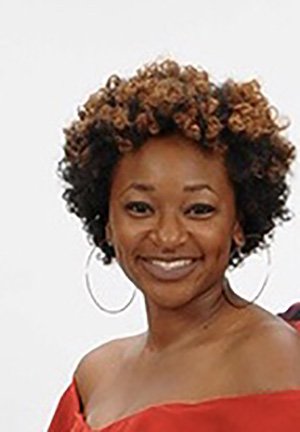
Tiera Evans, BSCH ’09As a current administrator at a Bobcat-owned childcare center in Cleveland, Evans is working toward a career in social work. She will begin graduate school at Cleveland State University in the fall.
Dean:Early in the program — when it was under the direction of Christine Taylor — she had a hundred-dollar bill. She ripped it in half in front of us. She then told us, “When you don’t go to class, and you don’t do what you need to do, you’re wasting money.” So that stuck with me throughout my college years.
Evans:We went to Washington, D.C., with our graduate assistant Brandy Baker, and we worked on the Obama presidential campaign. We drove up there, so that was a fun thing. We got to meet people from different areas: Washington, D.C., Baltimore and other parts of the U.S.
Crafter:I had a very close and wonderful working relationship with [former associate director for diversity] Stacey Brinkley. She was always a champion of mine. She was always someone I had looked up to. She was always in my corner, always had my back.
Pierce:I’m remembering casual moments when we would just get together, because we always thought of Urban Scholars as a family. So when I think about Urban Scholars, I’m thinking about those casual moments of just laughter and joy.
Lindsay:We would attend Legacy Week during the summer. All of the admitted scholars would return to Athens for about a week, and we were tasked with creating a presentation that we had to give to the OMSAR [Office for Multicultural Student Access and Retention] office and President Roderick J. McDavis and his wife, Deborah. For many of us, that was our first time meeting each other.
How are you applying some of the things you learned at OHIO to your current career?
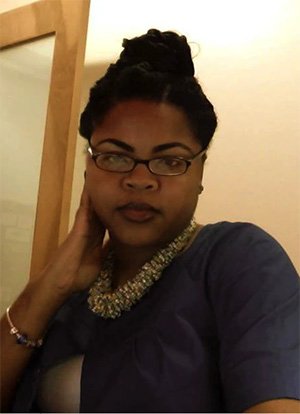
India Pierce, BA ’10Pierce is currently pursuing a doctorate at the University of California, San Diego. Her professional work examines diversity and inclusion, and she co-owns Sistah Sinema, an organization that screens films made by or about queer women of color.
Dean:The importance of giving back. I think all of the roles that I’ve had, there’s some aspect of giving back. That’s something I want to continue to take with me and share with my children and other students with whom I come in contact.
Evans:One major thing is my time management skills. That’s something I learned while I was at OHIO. I have found ways to keep me on track and keep me organized, and that really helped me career-wise.
Crafter:Ohio University and the Urban Scholars Program shaped me into what I am today. It impacted my approach to everything and the way that I view things – whether that’s my optimism, my work ethic, the things that I approach every day with. That’s what I really learned when I was there.
Pierce:The questions that guided the scholarship that I was doing at OHIO are still some of the questions that I grapple with today, questions about gender and sexual orientation and religion. OHIO is when I really understood what it meant to be an activist.
Lindsay:I will really give a shameless plug to the [Ralph and Luci] Schey Sales Centre in the College of Business. I was a part of that program for a couple of years. It set me on a path for the careers that I’ve had.
What has been your biggest accomplishment since graduation?
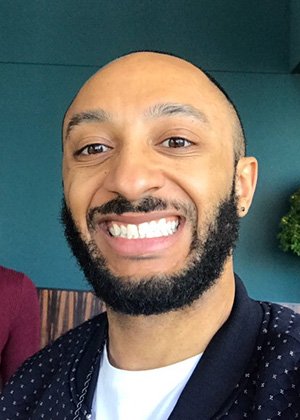
Josh Crafter, BSC ’11After graduating from OHIO, Crafter received his master’s degree in advertising from Syracuse University. He moved to New York City to pursue a successful career in advertising.
Dean:I was able to be a part of the United Way of Central Ohio Project Diversity Program, a leadership development program for emerging leaders of color. It was super competitive, so I was very excited to be a part of that. Now, I’m connected with over 500 professionals of color throughout Central Ohio.
Evans:Being a mom. I graduated in June 2009 and found out I was pregnant in September. Adjusting to being a mom and going straight to the workforce instead of doing internships or certain things that I had planned – that is my biggest accomplishment.
Crafter:Moving to New York. Several of my senior year roommates had already moved to the city. I had this wonderful support system when I moved.
Pierce:It’s yet to come.
Lindsay:My family. I’m married. We’ve been married now for nearly six months. And we’re expecting a baby in April. All of the work accomplishments – they’re awesome. But it takes so much more work to be in a healthy, functional relationship.
What advice would you give your college-aged self?
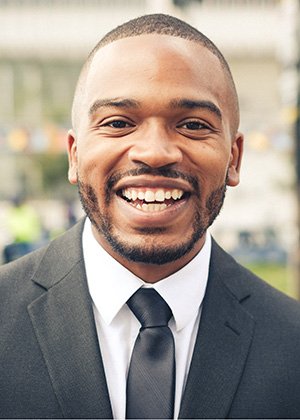
Donald Lindsay, BSS ’12Lindsay has worked in various sales roles since graduation. He relocated to the San Francisco Bay Area in California in 2016.
Dean:It may seem difficult now, but it’s really not that serious. A lot of times in the moment, you’re just thinking, “Oh my gosh, I have so much to do. I’m so busy,” and you take yourself too seriously. But at the end of the day, you haven’t even really started adulting yet.
Evans:Not to be afraid, and not to second-guess yourself. Whatever you want to go for, just do it.
Crafter:Keep being yourself. Keep listening to people who have criticism for the things that you do, but don’t necessarily take it as personal as you want to.
Lindsay:I would encourage college-aged me to step outside of my comfort zone more. I think that college in itself is that step for a lot of people, but it’s easy to fall into the everyday rhythm of being a student.

